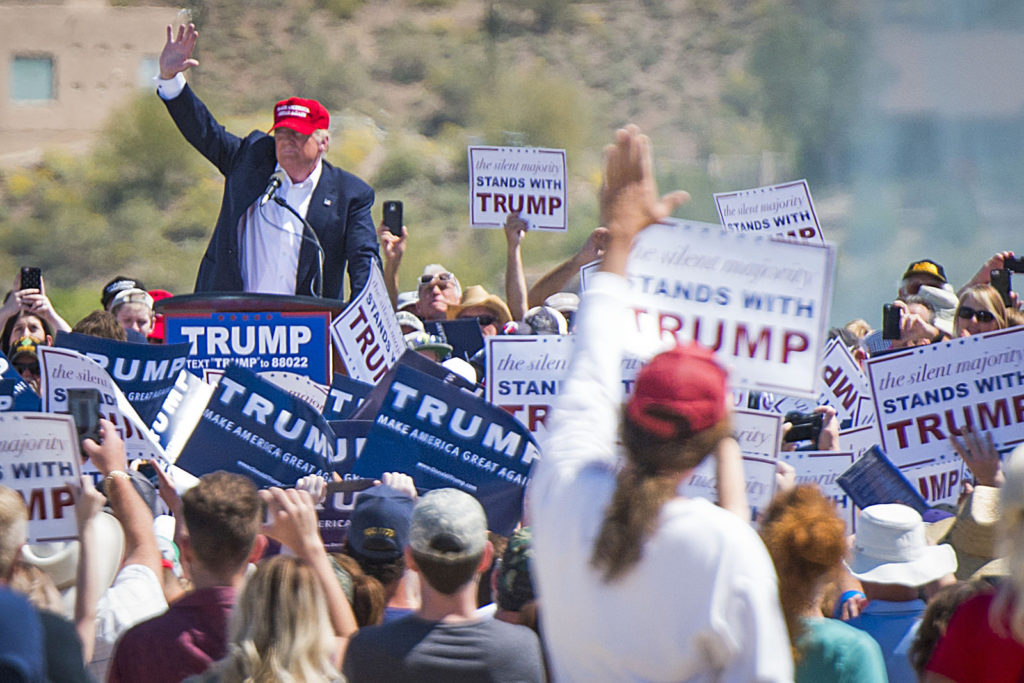“If you move from a democracy of the elites to a pure democracy of the will of the people, you will pay a very, very heavy price. Governing is a complicated and difficult job — it’s not something which can helpfully be outsourced to the masses, especially when the people often base their opinions on outright lies. […] If you really believe in democracy, you don’t just kick out the elites. You take it upon yourself to put together a coherent alternative platform — one which will spread prosperity more evenly. All democracies need effective leadership, and plan beats no plan every time.” — Felix Salmon in response to Brexit
Tag: democracy
This website was archived on July 21, 2019. It is frozen in time on that date.
Sonya Mann's active website is Sonya, Supposedly.
The Means Are All There Is

Blood in the Polity
Earlier this month, Trump supporters were attacked by protesters outside of a political rally in San Jose. Leftists and liberals (the leftists would say “neoliberals”) clashed over the issue. Those with anarchist and Marxist bents argued that violence is justified in face of xenophobia and fascism.
It's very simple. If this is the beginning of American fascism, real organized political violence is called for. If it's not, it's not.
— HR-Compliant Freddie (@freddiedeboer) June 3, 2016
“A lot of political commentators recognize that Donald Trump poses a categorical threat to established norms of American democracy, governance, and society. They believe that he represents (whether intentionally or not) an ideology that is hostile to groups of nonwhite Americans. […] You don’t have to agree with protesters beating up Trump supporters, or even sympathize with them, to understand this. There are people who feel Trump’s rise puts their lives in danger. And many people make decisions about what actions are ‘appropriate’ differently when they feel personally under threat.”
Jonathan Chait critiqued this view:
“Yes, electing Trump would amount to a dire peril for American democracy. But not only is violence unlikely to prevent his election as a practical matter (it makes Trump a figure of sympathy, and at any rate, his supporters are far more heavily armed). It would also be a disaster as a moral matter. Suppose that Trump’s election could be prevented by breaking up his speeches and intimidating his supporters. Such a ‘victory’ would actually constitute the blow to democracy it purports to stop, eroding the long-standing norm that elections should be settled at the ballot box rather than through street fighting.”
Chait continued:
“Liberalism sees political rights as a positive good — rights for one are rights for all. ‘Democracy’ means political rights for every citizen. The far left defines democracy as the triumph of the subordinate class over the privileged class. Political rights only matter insofar as they are exercised by the oppressed. The oppressor has no rights. […] A liberal sees Trump’s ability to deliver a speech before supporters as a fundamental political right worth defending. A radical sees this ‘right’ as coming at the expense of subordinate classes, and thus not worth protecting.”

The Point of Liberalism
Why am I bringing this up? Both arguments have been tweeted to death, including by me. Well… the conflict has stuck in my brain. I think my takeaway is something like this: Don’t normalize tactics that you don’t want your enemy to use. Resist upping the ante. Your principles are only as good as how you deploy them. Or, to quote Slate Star Codex:
“Civilization didn’t conquer the world by forbidding you to murder your enemies unless they are actually unrighteous in which case go ahead and kill them all. Liberals didn’t give their lives in the battle against tyranny to end discrimination against all religions except Jansenism because seriously fuck Jansenists. Here we have built our Schelling fence and here we are defending it to the bitter end. […] Liberalism does not conquer by fire and sword. Liberalism conquers by communities of people who agree to play by the rules, slowly growing until eventually an equilibrium is disturbed.”
(See also: “We should all feel unsafe around anybody who relishes uncoordinated meanness — beating people in dark alleys, picketing their funerals, shaming them, harassing them, doxxing them, getting them fired from their jobs.”)
Ends Are Made of Means
“Means to an end” is a familiar phrase. The end is the goal, and the means are how you get there. For example, democratic government is presented as the means to a just society. Democracy is not virtuous in and of itself; it’s virtuous because of what it can achieve. (Yes, I know the US is not a pure democracy, but it’s grounded in democratic principles.)
But really, the means are all there is. What we do while trying to achieve a certain state — whether governmental or epistemic — ends up being the state. Democracy is both process and result. Make sure your process constitutes a result that will satisfy you.
No Such Truths Are Self-Evident
2018 update: I wrote this blog post in 2015. Some of my object-level positions have changed, but I still endorse the meta point about what “rights” are and where they come from.
Entitlement is the wrong framework for thinking about human rights. (To quote Frank Underwood in a completely different context, “Let me be clear: you are entitled to nothing.”) Human rights are not innate — they culminate from decisions that we make semi-collectively about the kind of government and society we want to have. I think this applies to the rights in America’s Bill of Rights and the United Nations’ Universal Declaration of Human Rights as well as various more prosaic rights.
For example, you do not “deserve” to earn a minimum wage simply by virtue of being born. However, if you are born in America and join the workforce at a certain point in time, our laws establish that you must be paid at least $7.25 per hour. This is a decision that we’ve made, although the process of getting there was complex. (To be clear, I do think having a minimum wage is good.)
Looking at human rights in this way enables a much more rational discussion about what we want our government to do. Instead of arguing about whether children are somehow innately entitled to education, a moral argument for which there is no logical basis, we discuss whether we want to live in a society of people who had the opportunity to learn how to read and do algebra. The second argument allows a discussion of tradeoffs — yes, not funding public schools is cheaper, but in the long run it’s terrible for the economy and everyone’s quality of life.
I must admit the possibility that this viewpoint is more obvious than I think, but I feel like conversations about politics often hinge on ideas about what people “deserve”, without going into how moral entitlements are defined and conferred.
Immigration is another example. The right-wing “immigrants are stealing our jobs” narrative depends on a feeling of entitlement to jobs (and it’s no accident that workers with the least economically defensible employment make up a large portion of the GOP’s base, especially in the South). The impulse toward self-defense is understandable, but it’s built on an obfuscated attempt at a societal decision. Do we want to decide that everyone deserves a job? Is the government then responsible for providing them? Wouldn’t that take us even farther toward socialism — do we/I/you want that or no?
The left has a similarly ill-founded moral argument regarding immigration, one that I’m guilty of voicing. “Immigrants built this country, so we shouldn’t shut them out now!” The first clause is undoubtedly true, although it glosses over the devastation of indigenous populations and cultures, not to mention slavery, upon which America depended. Rhetoric always summarizes.
Anyway, the part I take issue with is “shouldn’t shut them out” — I agree with that, but I think we must be careful to interrogate the underlying decision. Are we deciding that America must have open borders — that the government is obliged to welcome and support any and all newcomers? If not, what limits do we want to put in place — are felons allowed? Convicted child molesters? Does it depend on the country of origin and the legal standards of the convicting country’s courts?
Personally, I want a government that is obliged to provide healthcare to everyone, housing to anyone who asks for it, education to anyone who wants it, and asylum to anyone who seeks it. (Yes, anyone — I’m not okay with the downsides of the other approach.) I want a government that runs its own prisons entirely with public money, and runs a lot less of them.
But I have no illusions that my ideal country is the natural or morally “right” system — it is a collection of decisions that none of us can make on our own. If we don’t talk about the decision-making process openly, how can we make the wisest choices?
Here’s an example of this worldview in action:
Look, a fetus is obviously alive and human. My pro-choice argument is that human life doesn't have inherent sanctity.
— Sonya 🌐 Mann (@sonyaellenmann) January 27, 2017
Basically, I think society works best from a consequentialist perspective when we have a taboo against killing babies outside of the womb…
— Sonya 🌐 Mann (@sonyaellenmann) January 27, 2017
…but not against killing babies inside of the womb. But really it's an academic exercise, since my view will never convert anyone.
— Sonya 🌐 Mann (@sonyaellenmann) January 27, 2017
I'm also an anti-natalist! That position is super unpopular. https://t.co/cnHIqSqzFB pic.twitter.com/APuDj3OSOZ
— Sonya 🌐 Mann (@sonyaellenmann) January 27, 2017
Sign up for my newsletter to stay abreast of my new writing and projects.
I am a member of the Amazon Associates program. If you click on an Amazon link from this site and subsequently buy something, I may receive a small commission (at no cost to you).